North Carolina sits atop a phosphorus dilemma. This essential plant nutrient is vital for optimal crop production, but the state has a stark agricultural nutrient imbalance. By importing animal feed and concentrating the nutrients in manure, North Carolina farmers have more phosphorus than they need. Nationally, phosphorus is in great agricultural demand but is increasingly expensive and in dwindling supply. North Carolina holds a trove of this organic fertilizer with an estimated value of $927 million.
The problem is that it’s stuck at the bottom of the state’s hog lagoons.
Innovation in animal waste management
Through a new USDA-NRCS Conservation Innovation Grant, the N.C. Foundation for Soil & Water Conservation is partnering with Phinite Inc. and North Carolina State University crop and soil sciences researchers on a low-cost method to dry swine sludge for easy transport and fertilizer blending. If successful, the project could turn a nagging concern into a potential revenue source for producers.
Currently, hog farms collect and treat manure in anaerobic treatment lagoons. The top liquid layer (effluent) is locally applied on spray fields, but the settled, phosphorus-rich solids accumulate below. This sludge is a source of high stress for farmers and environmentalists. Growers must periodically remove and dispose of the building sludge to maintain compliance with their permits. The heavy, wet material is expensive to transport and difficult to dispose of locally due to limited application site availability. High sludge levels make lagoons less efficient and can increase nuisance issues like odors.
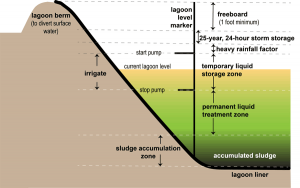
“Manure management is a double-edged sword,” Steph Kulesza, NC State assistant professor of nutrient management and animal waste. “Manure is an excellent source of a variety of nutrients, but swine sludge is incredibly high in phosphorus. An organic, slow-release phosphorus source is of great value to phosphorus-deficient agricultural areas, like the Midwest. N.C. already has a lot of phosphorus in our soils, the nutrients in the bottom of these lagoons could be better utilized elsewhere.”
Renewable revenue
Phinite’s innovative system uses a simple low-cost, low-energy solar process to dry the pre-digested, low-odor lagoon sludge into a granular product. The setup uses a robot to handle and mix the drying sludge, virtually eliminating labor costs. The finished, significantly lighter product can be easily transported and blended with other materials into a balanced organic fertilizer for sustainable farming.
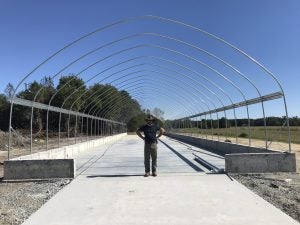
“Hog lagoon sludge has been heavily anaerobically digested and contains relatively low levels of ammonia,” Jordan Phasey, CEO of Phinite. “It is not an odor risk like raw manure, so complex and expensive odor management systems are not required.”
And it’s fast. Phinite predicts that its air-drying system can remove two years’ worth of sludge per year, resulting in total lagoon cleanout in 10 to 15 years.
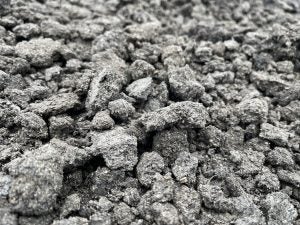
“Reducing lagoon sludge volume could significantly improve the local environmental footprint. We can lower the amount of phosphorus applied to effluent spray fields and also improve the resiliency of these animal operations to extreme weather events,” Kulesza said.
This new manure management system promises to improve lagoon efficiency, reduce environmental risk and create a recurring revenue stream for producers.
“By combining sludge drying with the current push to implement anaerobic digestion on swine farms, we’re on the cusp of being able to recycle absolutely everything that comes out of an animal on the farm. At a profit. This has the potential to completely transform the sustainability of agriculture,” Phasey said.
Profit is in the product
Experts have proposed previous manure management systems with similar benefits but at significantly higher costs. Phinite’s novel air-dryer design offers grower payback in just five years. The system could also be installed on a single farm to be used and cost-shared by multiple producers. But the plan’s cost efficiency is dependent on the quality and marketability of the resulting fertilizer product.
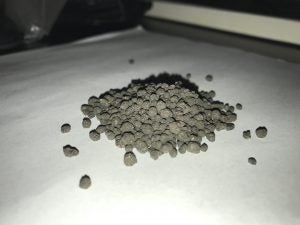
“We’re conducting lab and field trials to evaluate the nutrient availability of the final product,” Kulesza said. “We want to understand how this product compares to traditional inorganic fertilizer sources so we can accurately predict rate of use recommendations and how it can be best blended to meet crop nutrient needs.”
Her group will conduct two-year field trials on corn at two North Carolina research stations on multiple soil types to determine the product’s effectiveness as a phosphorus fertilizer. The study will evaluate extractable phosphorus and soil carbon as indicators of soil fertility and soil health. Yield and grain quality will also be measured.
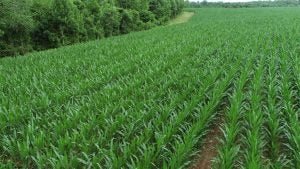
Selling dried waste is a path blazed long ago by municipalities. Milwaukee has marketed sewage sludge as an organic granular fertilizer under the ‘Milorganite’ brand for 96 years. It is commonly used by home gardeners and even some golf courses.
Phinite currently participates in entrepreneurial booster AgLaunch’s Accelerator program to build market capacity for selling the dried swine fertilizer product.
Starting with swine
Three eastern North Carolina farms will pilot the sludge dryers for the study and serve as demonstration hubs. Amanda Egdorf-Sand is the Executive Director of the N.C. Foundation for Soil and Water Conservation who received the NRCS-funded grant.
“The Foundation focuses on ways that we can support agriculture across North Carolina. We essentially serve as an incubator for conservation ideas that can be applied regionally and beyond in partnership with the Soil and Water Conservation Districts and other supporting partners,” Egdorf-Sand said. “Phinite’s approach is truly exciting as it can serve as a model for similar innovative efforts on other livestock operations. Manure management has been a pain point for many growers, so we look forward to working with NC State and Phinite to offer a transformative approach to managing nutrients that could also help the growers financially.”
“This could be a game-changer for our producers.”
Producers are already interested in the new manure management system, but adoption will depend on outcomes and communication. In addition to an industry advisory group, the research study will provide growers with business case evidence, fact sheets, YouTube videos and field days.
“This could be a game-changer for our producers. We’re starting with swine production, but this is relevant for other manure management or municipal systems too,” Kulesza said. “Row crop farmers need this fertilizer to optimize their crop yield and quality. Exporting sludge as a dry product could rebalance N.C.’s nutrient abundance to benefit farmers and the environment.”
Driving resource conservation
Authorized by the 2002 Farm Bill, Conservation Innovation Grants help develop the tools, technologies and strategies to support next-generation conservation efforts on working lands and develop market-based solutions to resource challenges.
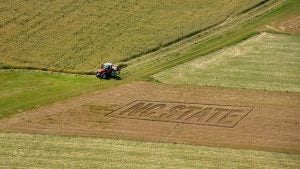
The NRCS will award $15,000,000 million in 2021 CIG national funding for 19 projects to drive public and private sector innovation in resource conservation. The program inspires creative problem-solving that boosts production on farms, ranches and private forests; they ultimately improve soil health, grazing lands, and organic systems. The Innovations in Animal Waste Management grant addresses the USDA’s nutrient management priority.
Want more inquiry?
Crop and Soil Sciences’ research impacts farmers, students, and North Carolina citizens. Follow how our discoveries affect agriculture and environmental science by joining NC State’s weekly newsfeed.
If you are a student interested in nutrient management or soil science, investigate our undergraduate and graduate degree programs, including a deep dive with the school’s soil degree e-book. Then join NC State for a guided email tour of our department and university.
Protecting North Carolina’s agriculture and environment through stewardship is just part of how we are growing the future.
This article was originally published here on NC State’s website. Jennifer Howard is a small farm owner and agricultural writer from the heart of North Carolina. She is a soil-first advocate, closet flower farmer, and lover of pollinators. Find her on LinkedIn @agwriterjenniferhoward.



